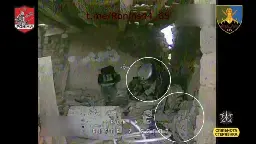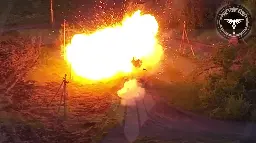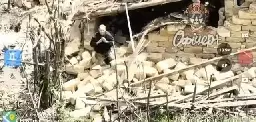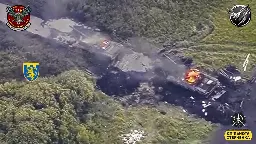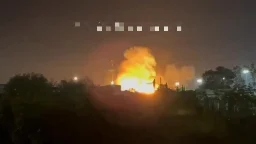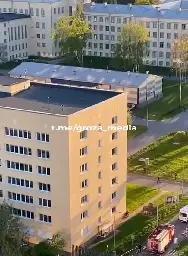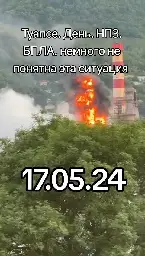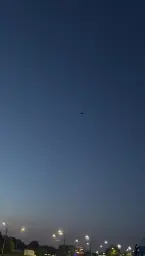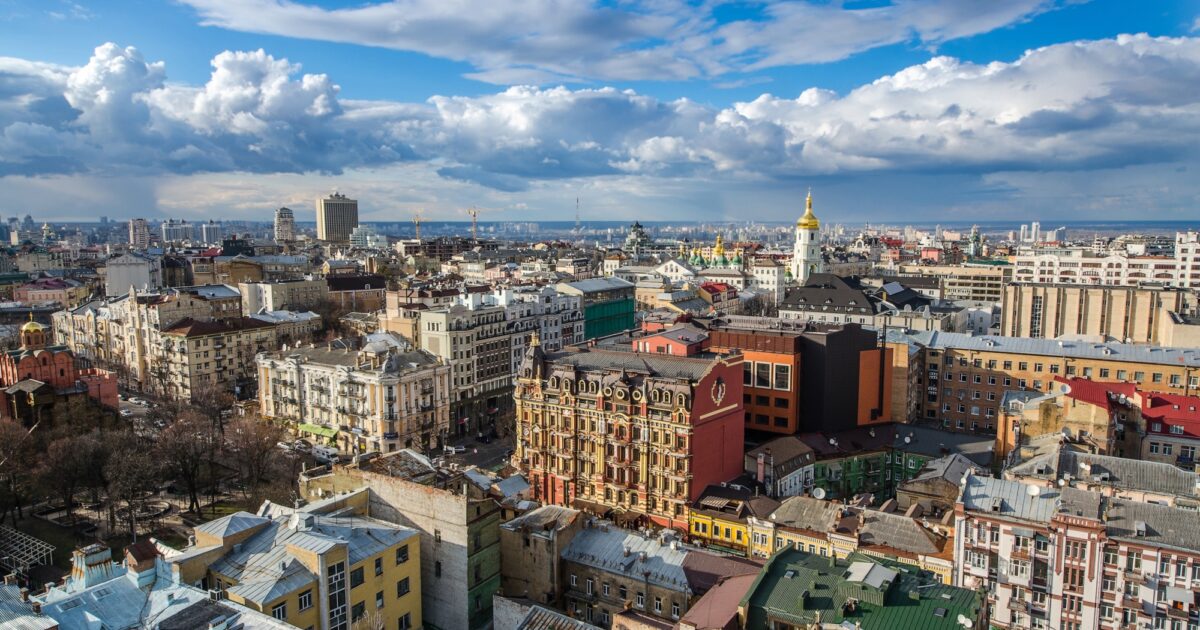
Ukraine
- Russian soldier puts a washing machine drum on his head when he sees an FPV drone.
https://t.me/ssternenko/28802
The Russians have a new EW system for individual protection - the bucket.
It was the bucket that one of the Katsaps put on his head when the Ronin launched your drone at them🔪 It didn't help.
UPD: they write that it is not a bucket. And part of the washing machine😂
- Russian court seizes assets from European banks UniCredit, Deutsche Bank and Commerzbank
- A St Petersburg court seized more than EUR 463mn in assets belonging to Italy's UniCredit and EUR 238mn belonging to Germany's Deutsche Bank.
- The court also seized assets of Germany's Commerzbank, but the details of the decision have not yet been made public so the value of the seizure is not known.
- The moves follow a claim from Ruskhimalliance, a subsidiary of Gazprom , the Russian oil and gas giant that holds a monopoly on pipeline gas exports.--
A St Petersburg court has seized over EUR700 mln worth of assets belonging to three western banks - UniCredit, Deutsche Bank and Commerzbank - according to court documents, the Financial Times and Reuters reported Saturday.
The seizure marks one of the biggest moves against western lenders since Moscow's invasion of Ukraine in 2022 prompted most international lenders to wind down their businesses in Russia.
The moves follow a claim from Ruskhimalliance, a subsidiary of Gazprom , the Russian oil and gas giant that holds a monopoly on pipeline gas exports.
The court seized EUR463mn-worth of assets belonging to Italy's UniCredit, equivalent to about 4.5 per cent of its assets in the country, according to the latest financial statement from the bank's main Russian subsidiary.
The frozen assets include shares in subsidiaries of UniCredit in Russia as well as stocks and funds it owned, according to the court decision that was dated May 16 and was published in the Russian registrar on Friday.
According to another decision on the same date, the court seized EUR238.6mn-worth of Deutsche Bank's assets, including property and holdings in its accounts in Russia.
The court also ruled that the bank cannot sell its business in Russia. The court agreed with Rukhimallians that the measures were necessary because the bank was "taking measures aimed at alienating its property in Russia".
On Friday, the court decided to seize Commerzbank assets, but the details of the decision have not yet been made public so the value of the seizure is not known.
The dispute with the western banks began in August 2023 when Ruskhimalliance went to an arbitration court in St Petersburg demanding they pay bank guarantees under a contract with the German engineering company Linde. The banks were among the guarantor lenders under a contract for the construction of a gas processing plant in Russia with Germany's Linde which was terminated due to Western sanctions.
Ruskhimalliance is the operator of a gas processing plant and production facilities for liquefied natural gas in Ust-Luga near St Petersburg. In July 2021, it signed a contract with Linde for the design, supply of equipment and construction of the complex. A year later, Linde suspended work owing to EU sanctions.
Ruskhimalliance then turned to the guarantor banks, which refused to fulfil their obligations because "the payment to the Russian company could violate European sanctions", the company said in the court filing.
The list of guarantors also includes Bayerische Landesbank and Landesbank Baden-Württemberg, against which Ruskhimalliance has also filed lawsuits in the St Petersburg court.
UniCredit said it had been made aware of the filing and "only assets commensurate with the case would be in scope of the interim measure".
Deutsche Bank said it was "fully protected by an indemnification from a client" and had taken a provision of about EUR260mn alongside a "corresponding reimbursement asset" in its accounts to cover the Russian lawsuit.
Commerzbank did not immediately respond to a request for comment.
Italy's foreign minister has called a meeting on Monday to discuss the seizures affecting UniCredit, two people with knowledge of the plans told the Financial Times.
UniCredit is one of the largest European lenders in Russia [it is the second largest Western bank in Russia after Austria's Raiffeisen Bank International], employing more than 3,000 people through its subsidiary there. This month the Italian bank reported that its Russian business had made a net profit of EUR213mn in the first quarter, up from EUR99mn a year earlier. It has set aside more than EUR800mn in provisions and has significantly cut back its loan portfolio.
Legal challenges over assets held by western banks have complicated their efforts to extricate themselves. Last month, a Russian court ordered the seizure of more than $400mn of funds from JPMorgan Chase (JPM) following a legal challenge by Kremlin-run lender VTB. A court subsequently cancelled part of the planned seizure, Reuters reported.
- The war exposed serious flaws in some of the most sophisticated US weapons systems: Precision-guided weapons have been jammed by Russian electronic warfare units; ammunition unable to be produced ...www.businessinsider.com The Ukraine war exposed serious flaws in some of the most sophisticated US weapons systems
The US is studying the Ukraine war for clues on conflicts of the future.
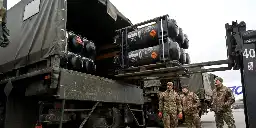
cross-posted from: https://lemmit.online/post/2950586
> ##### This is an automated archive made by the Lemmit Bot. > The original was posted on /r/ukrainianconflict by /u/Independent_Lie_9982 on 2024-05-19 06:41:34+00:00. >
- Russia's Kharkiv offensive – what is the plan?

YouTube Video
Click to view this content.
>Russia has launched an offensive into the Kharkiv region, and it has created a lot of alarmist news reports. In reality it is difficult to see what Russia's plan is, and it is not self-evident that it is a smart use of resources. In this video I discuss whether we might be seeing a return to the fragmented command structures that Russia had in the beginning of the war.
- Helicopter Carrying Iran’s President Has Crashed, State Media Reportswww.nytimes.com Helicopter Carrying Iran’s President Has Crashed, State Media Reports
Rescuers are trying to locate the helicopter on which President Ebrahim Raisi and Foreign Minister Hossein Amir Abdollahian were traveling, state media reported. Their status is unknown.

A helicopter carrying President Ebrahim Raisi crashed on Sunday, according to Iran’s state media and the country’s mission to the United Nations, but has yet to be found by search-and-rescue workers because of heavy fog.
- Canadian-made Roshel Senator MRAP that hit an anti-tank mine. All Ukrainian soldiers on board survived without injuries.

https://defence-blog.com/senator-mrap-saves-ukrainian-soldiers-from-mine-blast/
- Destruction of a Russian T-80 tank by the Strike Drone Company of the 47th Mechanized
https://t.me/strikedronescompany/234
Instant detonation of a Russian tank💥💥💥
The FPV drone, assembled in Ukraine from Chinese components, combined with a Soviet cumulative grenade destroys the occupiers' tank.
Enjoy watching friends. Thanks for support!
Every day, new videos on the channel of the 47th OMBr attack UAV company channel ⬇️⬇️⬇️
https://t.me/strikedronescompany
Subscription is mandatory 🔝🔝🔝
We publish only our work. Without politics, news and other unnecessary things.
Let's destroy 💥 Russian 🐽 together 🚁 🛩
- Estonian parliament adopts law allowing use of Russian frozen assetswww.riigikogu.ee The Riigikogu passed the Act enabling the use of Russia’s frozen assets - Riigikogu
Today, the Riigikogu (Parliament of Estonia) passed the Act that enables the use of the assets of persons in Russia that are frozen under international sanctions to compensate Ukraine for war damages.
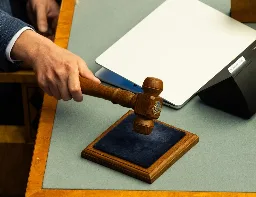
Estonian MPs passed a law that enables the use of Russian assets frozen under international sanctions to compensate Ukraine for war damages.
The president must now promulgate the legislation for it to enter into force.
It enables assets of individuals and companies that have contributed to Russia's wrongful acts, which have been frozen under sanctions, as an advance payment for damages owed by Russia to Ukraine.
To seize Russian assets, Estonia would need to receive a request, and the connection of their owner to illegal acts must be sufficiently proven. The asset owner can challenge their use for Ukraine in Estonian courts.
Estonia's move is seen as an important first step as the vast majority of Russia's frozen and largely euro-denominated sovereign assets, which are worth €300 billion, are located in Europe.
- Ukraine’s Usyk beats Fury to become undisputed heavyweight boxing world championsports.yahoo.com Ukraine’s Usyk beats Fury to become undisputed heavyweight boxing world champion
Oleksandr Usyk scored a razor-thin split decision over Tyson Fury to become undisputed heavyweight boxing world champion in a thrilling contest at the Kingdom Arena in Riyadh in the early hours of Sunday morning.
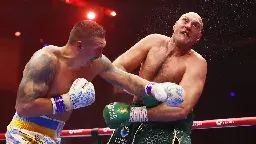
- Taiwan's outgoing president says boosting her country's military was the only way to defy China's threat - and that 'democratic countries need to support Ukraine'www.bbc.com Tsai Ing-wen: The president who reset Taiwan’s relationship with China
Taiwan's outgoing president says boosting her country's military was the only way to defy China's threat.
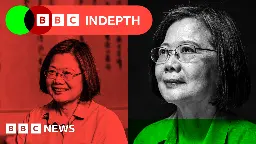
When Tsai Ing-wen, Taiwan's President who soon leaves office after eight years and hands over to her successor William Lai, swept to power in 2016, she was dismissed as a dull bureaucrat. But she stood up to an increasingly authoritarian and aggressive China under Xi Jinping; she held on to a vital US alliance under Donald Trump and buttressed it under Joe Biden. At home, she expanded the island’s defence and legalised same-sex marriage, the latter a first for Asia.
Good examples of the brand Taiwan – a democracy that the world should care about losing. “People say we are more important than Ukraine - strategically our position is more important and our place in the supply chain - and that they should shift support to Taiwan. We say no. The democratic countries need to support Ukraine,” Tsai says.
Rather than Taiwan’s wildly successful chip industry, which could be replicated, instead Tsai wields the one thing she has and the Chinese Communist Party doesn’t: the soft power of democracy. --
It is a well-known fact that the diminutive, soft-spoken president of Taiwan does not like doing interviews.
It’s taken months of quiet negotiations to sit down at Tsai Ing-wen’s dining table in her Taipei residence, not long before she leaves office after eight years and hands over to her successor William Lai.
Even so, the president seems keener to ask about me than talk about herself. She is certainly more comfortable showing us her cats and dogs than answering questions in front of a rolling camera.
“That’s Xiang Xiang,” she says, pointing to the large, grey tabby eyeing me suspiciously through the open doorway. “Would you like to meet her?”
When Tsai Ing-wen swept to power in 2016, she was dismissed as a dull bureaucrat and ridiculed as a “cat lady” - a swipe at her for being middle-aged and unmarried. She embraced the image, appearing on magazine covers holding Xiang Xiang in her arms. Soon, her supporters adopted a new sobriquet: Taiwan’s Iron Cat Lady.
Tsai admits to a sneaking admiration for Margaret Thatcher, although she’s quick to add it’s because of her toughness as a female leader, not her social policies.
In Tsai Ing-wen, Taiwan found an unlikely champion. During her two terms, she carefully yet confidently reset the relationship with Beijing, which has claimed the independently governed island as its own for 75 years.
She stood up to an increasingly authoritarian and aggressive China under Xi Jinping; she held on to a vital US alliance under Donald Trump and buttressed it under Joe Biden. At home, she expanded the island’s defence and legalised same-sex marriage, the latter a first for Asia.
While Tsai shied away from the spotlight in Taiwan’s boisterous politics, Xiang Xiang became a celebrity. She played a starring role in Tsai's 2020 re-election campaign, along with the president’s other cat, a ginger tom called Ah Tsai.
Tsai has her detractors. Beijing is no fan, and neither are the many older Taiwanese, who want better relations with China, where they have family and business interests. Domestically, she has been criticised for not doing enough for the economy – the rising cost of living, unaffordable housing and a lack of jobs cost her party young voters in January's election.
And her biggest critics fear that she has made the island of 23 million more, rather than less, unsafe.
Put crudely, this is what any Taiwan leader faces: a much bigger, wealthier, and stronger neighbour, who says he owns your house, is willing to let you hand it over without a fight, but is ready to use force if you refuse. What do you do?
Tsai’s predecessor, Ma Ying-jeou, chose conciliation and a Beijing-friendly trade deal.
But he miscalculated how young Taiwanese would react to what they saw as appeasement. In 2014, thousands took to the streets in what became known as the Sunflower Movement. When President Ma refused to back down, they occupied parliament.
Two years later Tsai Ing-wen was elected on a very different calculus: that the only language Beijing understands is strength.
Now, as she prepares to step down, she says she has been vindicated: “China has become so aggressive and assertive.”
Dear Beijing - back off
“Wow, you’re really tall,” the president exclaims, craning her neck at a lanky, young soldier standing stiffly to attention.
He tells her he is 185cm and she asks, with genuine concern, “Are the beds here big enough for you?” They are, he reassures her.
This was on a recent morning in April at a new special forces training centre on the outskirts of Taipei, which Tsai had just opened.
The relaxed and chatty president disappears when she enters the cavernous dining hall, where hundreds of crew-cut recruits stand to attention and shouted “Zong Tong Hao!”, or “Hello, President!”
She almost looks out of place in these settings. Her speech is worthy and matter of fact, with no soaring rhetoric. And yet such visits are quite frequent, to make sure the military reforms she has pushed through are paying off.
One of the most difficult was a return to a year of military service for all men over the age of 18. While she admits it is not popular, she says the public accepts it is necessary: “But we have to make sure that their time spent in the military is worthwhile.”
For a former law professor and trade negotiator, Tsai has spent a surprisingly large amount of time as president donning camouflage fatigues. In one famous image she’s seen shouldering a rocket launcher. The reason: she believes Taiwan cannot hope to fend off Beijing without a modern, well-trained military in which young Taiwanese are proud to serve.
While China's threat of invasion is not new, it is only recently that President Xi Jinping has gained the military capability to mount what would still be a huge and risky operation. His threats have also become more urgent and ominous. He has said twice that a resolution over Taiwan cannot be passed down from one generation to another, which some have interpreted to mean that he wants it done in his lifetime.
On the other side of the strait, Tsai has set about rebuilding Taiwan’s outdated, demoralised and ill-equipped ground forces. It has been an uphill struggle, but results have begun to show. Yearly defence spending has risen significantly to about $20bn (£16bn).
“Our military capability is much strengthened compared to eight years ago. The investment we have put in to military capacity is unprecedented,” Tsai says.
I have spoken to many in Taiwan’s opposition who genuinely believe Tsai’s strategy of building up the military is naive, if not dangerous. They point to China’s powerful navy, the world’s largest, and more than two million active troops. Taiwan’s forces are not even a tenth of that.
To Tsai and her supporters that is missing the point. Taiwan is not trying to defeat a Chinese invasion, they say, but dramatically increasing its price to deter China.
“The cost of taking over Taiwan is going to be enormous,” Tsai says. “What we need to do is increase the cost.”
Tsai was no stranger to Beijing, or the Chinese Communist Party, when she became president. Her unorthodox rise to power began in the mid-1990s, when she cut her teeth as a trade negotiator. She then caught the eye of Chen Shui-bian, the first president from the pro-independence Democratic Progressive Party (DPP). He appointed her to run Taiwan’s top body for dealing with China. There she rewrote the book on how Taiwan should handle Beijing.
She has long known where the red lines are - and she believes that to resist China, Taiwan needs allies: “So strengthening our military capacity is one and working with our friends in the region to form a collective deterrence is another.”
Many in Tsai’s party, the DPP, now talk of a new alliance that stretches from Japan and South Korea to the north, through the Philippines to Australia in the south – with the US as quarterback, holding the team together. But this is theoretical at best. There is no Asian Nato and Taiwan enjoys no formal military alliances. Despite mutual antipathy towards Beijing, Tokyo and Manila are both deeply reluctant to vow support for Taiwan. Even that most important ally, Washington, has stopped short of guaranteeing it would put boots on the ground.
But Tsai is optimistic. “A lot of other countries in the region are alert and some of them may have a conflict with China,” she says, referring to rival claims by Beijing, Tokyo and Manila over disputed waters and islands.
“So, China is not an issue for Taiwan only. It is an issue for the whole region.”
The power of soft power
Painting China as a big, bad bully is not hard for a Taiwan president. The trickier job is to find allies who would risk irking the world’s second largest economy.
And that’s why Taiwan leads such an increasingly lonely diplomatic existence. In the last decade China has put the squeeze on many of the island’s allies who still recognise it – only 12 remain now, most of them tiny Pacific Island and Caribbean micro-states.
Tsai believes the way out of this diplomatic isolation is to build alliances with what she calls “like-minded democracies”.
To that end she hosts dozens of parliamentary delegations from all over the world, a loophole for meeting foreign dignitaries from countries that don’t see Taiwan as one. Last month I attended Holocaust Memorial Day. There was music and poetry, and an impassioned speech to never forget by the representative from Germany.
There are also more unusual events. Earlier this week, while Xi Jinping was getting ready to welcome Vladimir Putin in Beijing, Tsai Ing-wen hosted a drag performance by Taiwanese-American Nymphia Ward. “This is probably the first presidential office in the world to host a drag show,” Nymphia reportedly told Tsai.
Both are examples of brand Taiwan – a democracy that the world should care about losing.
“People say we are more important than Ukraine - strategically our position is more important and our place in the supply chain - and that they should shift support to Taiwan. We say no. The democratic countries need to support Ukraine,” Tsai says.
Rather than Taiwan’s wildly successful chip industry, which could be replicated, instead Tsai wields the one thing she has and the Chinese Communist Party doesn’t: the soft power of democracy.
In the run up to January’s election, the rainbow flag was hard to miss at every DPP rally.
“In Taiwan we are free to live how we choose. We could not do this in China,” one couple told me.
It’s a remarkable change from when I was a student here more than 30 years ago. Taiwan was still emerging from four decades of military rule. I remember a gay friend desperately looking for a way to get to America. Back then, if you were found to be homosexual during your military service you could get thrown in jail or a psychiatric ward.
That changed but Tsai Ing-wen’s government went further than any in Asia when it pushed through legislation legalising same-sex marriage in 2019. A little over half the population still opposed it. Some, including church and family groups, ran a vociferous campaign against it. It was a big political risk, and one that could have cost her re-election.
Tsai calls it a “very difficult journey” but one she saw as necessary: “It's a test to society to see to what extent we can move forward with our values. I am actually rather proud that we managed to overcome our differences.”
Taiwan is still conservative and patriarchal. I ask Tsai if she’s worried it might return to being a “boys club” once she, the island’s first female president, steps down. “I have a lot of opinions about that boys club!” she says but does not elaborate.
The island’s strength, in her opinion, is its mixed heritage – it’s a society of immigrants.
The Chinese came in many waves, sometimes centuries apart, and they joined hundreds of thousands of indigenous peoples.
“In… [such a] society, there are a lot of challenges,” Tsai says. “People are less bound by the traditions. The main goal is to survive [as a society]. This is why we have been able to move from an authoritarian age to democracy.”
And that is why she hopes Taiwan’s most important alliance – with the world’s most powerful country and democracy - will last no matter who makes it to the White House after November.
Best friends forever?
After Donald Trump’s stunning victory in 2016, Tsai Ing-wen rang to congratulate him – and she was put through. No US President since Jimmy Carter had taken a call from the president of Taiwan. Tsai has described the call as short but intimate, and wide-ranging.
The truth is Trump is a wild card for Taiwan. He’s criticised the island for “stealing America’s semiconductor industry”, but, as Tsai points out, he has also approved more arms shipments to Taipei than any of his predecessors. But she doesn’t want to discuss him, or the possibility of his return to the Oval Office.
What she does want to emphasise is the perception of a growing China threat.
“The rest of the world is telling China that you can't use military means [against Taiwan]. No unilateral action is allowed and no non-peaceful means is allowed and… I think China got the message,” she says.
That might be wishful thinking. There has been no noticeable decrease in military pressure. Rather, China regularly sends dozens of military aircraft and ships across the median line that divides the waters and airspace of the Taiwan strait. In 2022, Beijing declared that it no longer recognises what was effectively the border. The trigger was one of Tsai’s diplomatic coups.
US House Speaker Nancy Pelosi’s historic visit in 2022 was celebrated in a Taiwan starved of international recognition. But China was furious, firing ballistic missiles over the island, and into the Pacific Ocean, for the first time ever.
It was a warning. Even some inside Tsai’s own administration worried quietly that Pelosi’s visit had been a mistake.
“We’ve been isolated for such a long time,” she says. “You just can't say no to a visit like that of Speaker Pelosi. Of course it comes with risks.”
You can feel the tension in her voice. Her opponents say the Pelosi visit was reckless and left Taiwan more exposed. Even President Biden is thought to have opposed the trip.
But Tsai says this is the line Taiwan must walk.
“I had to turn a party of revolutionaries into a party of power,” Tsai Ing-wen says of her time at the DPP’s helm.
When she took over, she was an economics graduate leading a party of older, male radicals who had spent their early lives fighting for Taiwan independence – or behind bars for it.
There is no need for Taiwan to hold a referendum or declare independence, she says, because it is already an independent, sovereign nation.
“We are on our own. We make our own decisions; we have a political system to govern this place. We have a constitution, we have laws, we have a military. We think that we are a country, and we have all the elements of a state.”
What they are waiting for, she says, is for the world to recognise it.
- Nato’s failure to save Ukraine raises an existential question: what on earth is it for?www.theguardian.com Nato’s failure to save Ukraine raises an existential question: what on earth is it for? | Simon Tisdall
The military alliance is turning 75. But there’s little to celebrate in Kyiv, as Putin’s forces continue their bloody advance
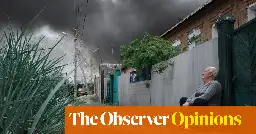
- 80th Anniversary of Deportation of Crimean Tatars Commemoratedwww.kyivpost.com 80th Anniversary of Deportation of Crimean Tatars Commemorated
President Zelensky led a commemoration ceremony in Kyiv for the victims at the site of a new Memorial Monument and noted the plight of Crimean Tatars today in Crimea under Russian occupation.
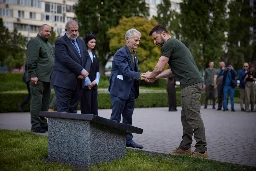
- The total combat losses of the enemy from 24.02.22 to 19.05.24

Загальні бойові втрати противника з 24.02.22 по 19.05.24 (орієнтовно)
#NOMERCY #stoprussia #stopruSSiZm #stoprussicism #ВІРЮвЗСУ t.me/GeneralStaffZSU/14724
- Estonia ‘seriously’ discussing sending troops to ‘rear’ jobs in Ukraine, official saysbreakingdefense.com Estonia ‘seriously’ discussing sending troops to ‘rear’ jobs in Ukraine: Official
The national security advisor to the Estonian president is the latest NATO nation official to weigh into the debate over the wisdom of foreign forces in Ukraine, while a senior British officer said it's still "not a path that the [UK] Prime Minister wants to go down."
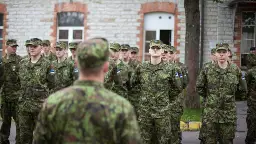
The national security advisor to the Estonian president is the latest NATO nation official to weigh into the debate over the wisdom of foreign forces in Ukraine, while a senior British officer said it's still "not a path that the [UK] Prime Minister wants to go down".
The government of Estonia is “seriously” discussing the possibility of sending troops into western Ukraine to take over non-direct combat, “rear” roles from Ukrainian forces in order to free them up to fight on the front, though no decision is imminent, Tallinn’s national security advisor to the president told Breaking Defense.
Madis Roll said the executive branch is currently undertaking an analysis of the potential move, and though he said Estonia would prefer to make any such move as part of a full NATO mission — “to show broader combined strength and determination” — he didn’t rule out Estonia acting in a smaller coalition.
“Discussions are ongoing,” he said on May 10 at the presidential palace here. “We should be looking at all the possibilities. We shouldn’t have our minds restricted as to what we can do.” He also emphasized that it’s “not unthinkable” that NATO nations opposed to such a move would change their minds “as time goes on.”
Following publication of this report, Madis clarified that such a decision is not pending before the Estonian prime minister or her cabinet specifically, and he meant only that the discussion “is not dead” and is “ongoing in Estonia in general.” “We have not excluded any option in the future,” he said.
Estonian Defense Minister Hanno Pevkur on May 14 told the European news outlet ERR such talks haven’t “gone anywhere” in Tallin.
“There is nothing new here. When France came up with the idea of considering whether Europe and the allies could do more, it has been floated in various discussions, but it has not gone anywhere, because at the moment there is no clear understanding among the allies of what it adds,” Pevkur said. “There is certainly no initiative by Estonia and certainly Estonia alone is not going to do anything.”
Roll’s boss, Estonian President Alar Karis, holds a position with many ceremonial duties relative to the nation’s prime minister, Kaja Kallas, but he is ultimately Estonia’s commander-in-chief and is a key figure in foreign policy.
Roll’s comments came after the head of Estonia’s defense forces, Gen. Martin Herem, told Breaking Defense earlier last week there had been discussions in the military months ago about sending troops to western Ukraine to take on jobs like medical services, logistics or air defense for some western cities, but the air had gone out of those talks after the idea became a public lightning rod.
Herem and Pevkur were referring to the outcry that followed French President Emmanuel Macron’s declaration that Western nations must be open to discussing sending their troops in to aid Ukraine. (Kallas, the Estonian PM, in March appeared to defend Macron’s statement, noting that he wasn’t talking specifically about sending ground troops into combat. “In the exact same way, I can assure you that our soldiers will not go there to fight,” she said.)
Also earlier last week a key Estonian lawmaker, Foreign Affairs Committee Chair Marko Mihkelson, told Breaking Defense that European nations “have to start thinking about a coalition of the willing” to more directly help Kyiv, potentially with direct combat forces. (The Estonian officials spoke last week to an audience from the Kaplan Public Service Foundation; Breaking Defense accepted accommodation in Estonia from KPSF.)
The willingness of different nations to send some forces into Ukraine is a potential dividing line inside NATO. Although each member of the alliance is free to send forces where it feels it must for its national interests, some nations have been clear they see more risk than reward in doing so.
Notably, Germany and the US have flatly rejected the idea of sending in troops. The US Ambassador to Estonia, George Kent, pointed Breaking Defense to the Biden administration’s policy of aiding Ukraine through significant aid packages, but a firm commitment not to send in American soldiers.
Asked May 9 in Washington how Russia could react to NATO-nation forces being in Ukraine, British Chief of Defense Adm. Sir Tony Radakin was evasive, saying, “I won’t go into too much commentary on your question, if you don’t mind … The UK position is very clear in terms of, that’s not a path that the Prime Minister wants to go down.
However, he emphasized that the UK position is not “being governed by how Russia will react.” Instead, he said, it is based around what the UK views as the best approach overall: “I think that what you’ve seen all the way through, is a UK that has done the right thing, based on its judgment of what’s needed to be done.”
In contrast, there is Macron’s statement, as well as Lithuanian prime minister Ingrida Simonytė who recently told the Financial Times she was open to sending Lithuanian troops into Ukraine to train Kyiv’s forces there. The FT wrote that Simonytė predicted Russia could see the move as an escalation, but added, “If we just thought about the Russian response, then we could not send anything. Every second week you hear that somebody will be nuked.”
- Air defence report - 19.05.2024

https://t.me/ComAFUA/292
⚡️ DESTROYED 37 IMPACT UAVS
➖➖➖➖➖➖➖➖➖
On the night of May 19, 2024, the Russian occupiers attacked Ukraine with 37 Shahed-131/136 attack drones from the Primorsko-Akhtarsk and Kursk regions - Russian Federation.
Anti-aircraft missile units of the Air Force, mobile fire groups of the Defense Forces of Ukraine and electronic warfare units were involved in repelling the enemy's air attack.
💥 As a result of anti-aircraft combat, all 37 "shaheeds" were shot down in Kyiv, Odesa, Mykolaiv, Sumy, Vinnytsia, Zhytomyr, Cherkasy and Kherson regions.
To everyone who secured this result, thank you for your hard work!
🇺🇦 Together to victory!
➖➖➖➖➖➖➖➖➖
🇺🇦 Air Force Commander Lieutenant General Mykola Oleschuk
- Slovakia: Suspect in court as Putin’s friends capitalise on shooting of prime minister Robert Ficowww.theguardian.com Suspect in court as Putin’s friends capitalise on shooting of Slovakian PM Robert Fico
Media is barred from hearing as 71-year-old man appears in closed session over attempted assassination of prime minister
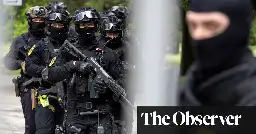
Media is barred from hearing as 71-year-old man appears in closed session over attempted assassination of prime minister.
While the attack on PM Fico has sparked fears in other European capitals that similar incidents could occur there, some in Slovakia say they were anxious the attack would embolden the authorities to launch assaults on the media, civil society and the opposition parties.
Other European leaders close to Fico like Hungarian prime minister Viktor Orbán have appeared to be eager to capitalise on his shooting, raising conspiracy theories. Fico is widely considered a divisive and populist official who has been criticised by the opposition for lashing out at independent media outlets and scrapping a special prosecutor’s office. --
The suspect in the shooting of Slovakian prime minister Robert Fico appeared in a closed court hearing on Saturday outside Bratislava amid growing fears about the future of the deeply divided nation.
The media was barred from the hearing, and reporters were kept behind a gate by armed police officers wearing balaclavas.
Fico, shot several times at point-blank range during a rally in the mining town of Handlová, had more surgery on Friday as the country reeled from the most serious attack on a European leader in decades.
The government has released only sparse details about the assailant or the health of the prime minister , who remains in a stable but serious condition.
Slovak media identified the attacker as Juraj Cintula, 71, who the authorities described as a “lone wolf” who had recently been radicalised.
A poet and former security guard, Cintula was known in his home town of Levice in provincial Slovakia as an eccentric but likable man.
His political views appear to have developed erratically. He is seen railing against violence in one YouTube clip, but later praising a violent pro-Russian paramilitary group on Facebook for their “ability to act without approval from the state”. He later adopted staunchly pro-Ukrainian views, which grew increasingly strong after Russia’s invasion.
In his published writing and personal conversations, Cintula expressed xenophobic views about the Romany community in Slovakia, a popular topic among the country’s far-right parties.
Neighbour and friend Mile L’udovit said the pair would occasionally discuss politics and that Cintula had been angry about the growing attacks on free speech under Fico’s leadership, a major topic of concern for the Slovakian leftwing opposition.
“No one knows why he did it, but I think it was a ticking timebomb before something like this would happen,” said Pavol Šimko, a 45-year-old history teacher, speaking in central Bratislava on Friday.
Wednesday’s assassination attempt in Handlová, 112 miles from the capital, has shone a light on what officials and many Slovaks say should be seen as a wider symptom of the country’s polarised political environment.
“We are now truly becoming the black hole of Europe,” added Šimko, referring to comments made by former US secretary of state Madeleine Albright, who coined the phrase to describe Slovakia in 1997 after the abduction of the son of then president Michal Kováč and the murder of a key witness in the case, police officer Róbert Remiáš.
Acts of political violence have become a grim fixture in recent Slovak history, but this latest is by far and away the most serious.
Other European leaders close to Fico, a divisive and populist official who has been criticised by the opposition for lashing out at independent media outlets and scrapping a special prosecutor’s office, have appeared to be eager to capitalise on his shooting.
Speaking on state radio on Friday morning, the Hungarian prime minister, Viktor Orbán, drew a link between Fico’s views on the war in Ukraine and the attempted assassination.
Since Fico’s return to power, “Slovakia started on the path of peace, and this was a big help for Hungary,” Orbán said. “We have now lost this support. We know that the perpetrator was a pro-war person,” he added, without providing any evidence.
The Hungarian prime minister, who often employs conspiratorial narratives, has spent more than a decade nurturing a relationship with the Kremlin and has repeatedly argued the west should stop providing support to Ukraine.
> *"Of course [Fico] he became the target. There are only a few like him in Europe. And they need to take care of their own safety." *- Dmitry Medvedev, former Russian president
In his radio interview, he suggested – again without evidence – that the shooting in Slovakia was part of a geopolitical struggle. “The combinations that connect the assassination attempt with the war are not unjustified,” he said.
“The pro-war parties are negotiating with each other, which is why the head of the [George] Soros empire and the US secretary of state also went to Kyiv,” Orbán said.
In Moscow, former Russian president Dmitry Medvedev praised the Kremlin-friendly Fico, also implying that he was targeted for his views on the Ukraine war. “Of course, he became the target. There are only a few like him in Europe. And they need to take care of their own safety,” he said.
Ľudovít Ódor, opposition party Progressive Slovakia’s lead candidate for the European parliamentary elections, said that foreign politicians “should not misinform foreigners and should not make political capital out of this for themselves”.
In an interview with independent Hungarian news outlet Partizán, Ódor, who briefly served as Slovakia’s caretaker prime minister last year and comes from Slovakia’s Hungarian-speaking minority, warned that “we have seen how this just comes back like a boomerang to us”, noting that many people in southern Slovakia watched Hungarian media.
The attack has also raised questions about a possible failure by the Slovak security services and sparked fears in other European capitals that similar incidents could occur there.
Slovak authorities have opened an investigation into the response of security forces at the scene. A source said that the security services were caught off guard and that Cintula was not known to them.
“Other European security services will be looking at their measures, realising that the danger can come out of nowhere,” the source said.
Polish PM Donald Tusk said on Thursday he received threats after the assassination attempt on his Slovakian counterpart, with a media outlet reporting his security protection would be strengthened.
In Belgium, prime minister Alexander De Croo filed a police complaint against a radio presenter who urged listeners to “take him out”.
“You see that it is possible to shoot down a prime minister. So I would say: Go ahead,” the radio presenter told his listeners on a station that airs from the Belgian province of West Flanders.
Some in Slovakia said they were anxious the attack would embolden the authorities to launch assaults on the media, civil society and the opposition parties.
“I worry that the ruling coalition will now use the shooting as a pretext for a big crackdown. They already started blaming the opposition and the media for it,” said Lenka Szabóová, a student in Bratislava. “This should be a time of coming together. But it seems like it will only tear us apart.”
- Intense first person view combat footage near Andriivka

YouTube Video
Click to view this content.
An amazing combination of strategic commentary, drone footage and helmet cam footage.
- "Weaponising threat of mass migration": Putin aims to "make life really impossible in Ukraine so that there would be migration pressure to Europe", Estonian PM sayswww.theguardian.com Putin seeking to weaponise threat of mass migration, warns Estonian PM
‘Adversaries know migration is our vulnerability,’ says Kaja Kallas, spelling out negative consequences to Europe of Ukrainian defeat
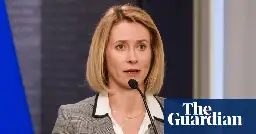
‘Adversaries know migration is our vulnerability,’ says Kaja Kallas, spelling out negative consequences to Europe of Ukrainian defeat
Vladimir Putin is seeking to weaponise the threat of mass migration to divide and weaken Europe as supporters of Ukraine struggle to maintain unity to defeat Russia, Kaja Kallas, the Estonian prime minister, says.
“What our adversaries know is migration is our vulnerability,” she said. “The aim is to make life really impossible in Ukraine so that there would be migration pressure to Europe, and this is what they are doing.”
Speaking in Tallinn on Friday, she said Russia had already created the migration pressure through disruption in Syria and in Africa via the Wagner group.
“I think we have to understand that Russia is weaponising migration. Our adversaries are weaponising migration.
“They push the migrants over the border, and they create problems for the Europeans because they weaponise this since with human rights, you have to accept those people. And that is, of course, water to the mill of the far right.”
Kallas admitted the plight of the Ukrainians on the front was “very serious” and European promises of extra weapons had not been delivered, something that could be rectified if Nato took charge of coordinating weapons delivery. “The problem is that our promises do not save lives,” she said.
Kallas is one of many European politicians trying to spell out the many negative consequences to Europe of a Ukrainian defeat, and rebut those who claim such a reverse could be contained.
She was speaking the day after the former Estonian president Toomas Ilves predicted that if Ukraine fell to Russia as many as 30 million Ukrainians would seek to flee. “That is the threat we face due to our inaction,” he said, adding that Europe had a “complete meltdown” when faced with 2 million refugees from the Middle East in 2015.
A pamphlet produced by pro-Ukrainian NGOs has detailed how Russian shelling between October 2022 and January 2023 had increased migration out of Ukraine by a quarter compared with the previous year.
The recent round of attacks has targeted electricity generation rather than transmission. Olena Halushka, board head at the international centre for a Ukrainian Victory, said: “Right now they are trying to bomb Ukraine into the stone age,” adding that in the past two months more damage had been inflicted than the whole of the winter of 2023.
She said: “Europe needs to think about Kharkiv, a city the size of Munich without energy this winter and then think about the financial implications of tens of millions of Ukrainians fleeing the war due to fear of occupation”.
Kallas said Russian assaults were now targeting Ukrainian cities every day and night.
She conceded that, based on geography and history, some countries in Europe did not see the threat of a Ukrainian defeat in the same way. “They don’t see and they don’t believe that if Ukraine falls Europe is in danger, the whole of Europe, maybe some countries, but not the whole of Europe”.
She said she feared a mistake was being made similar to the late 1930s, when linked conflicts were seen as isolated events. Kallas, tipped as a possible successor to Josep Borrell as EU high commissioner for foreign policy, cited links between the conflicts in Azerbaijan and Armenia, the Middle East, and the South China Sea. She said the same error was made in the 1930s about the Italian invasion of Ethiopia, the German occupation of Austria and the Sino-Japanese war.
“The lesson from 1938 and 1939 is that if aggression pays off somewhere, it will be taken up elsewhere. Ukraine’s defeat is something all aggressors will learn from. They will learn that in 2024, bluntly, you can just colonise another country and nothing happens to you.”
She pointed to what she described as baby steps to strengthening the European defence architecture, including a European defence fund, the increase in individual nation state defence spending, and the proposal for a shared defence debt bond to boost spending. She denied Estonia had had any serious discussions about sending troops to Ukraine, while arguing at the same time it was better to keep Putin guessing about Europe’s plans.
She said it was also a valid criticism that Ukraine was not moving fast enough to mobilise more troops.
Meanwhile, Russia’s foreign ministry warned the west it was playing with fire by allowing Ukraine to use western missiles and weapons to strike Russia, and said it would not leave such actions unanswered.
The foreign ministry said in a statement that it saw the hand of the US and Britain behind a recent spate of attacks, and blamed Washington and London for escalating the conflict by authorising Ukraine to use long-range rockets and heavy weapons they had supplied against Russian targets.
“Once again, we should like to unequivocally warn Washington, London, Brussels and other western capitals, as well as Kyiv, which is under their control, that they are playing with fire. Russia will not leave such encroachments on its territory unanswered,” the ministry said.
- China-Russia relations: Putin and Xi no longer have a partnership of equalswww.bbc.com Vladimir Putin and Xi Jinping: No longer a partnership of equals
Vladimir Putin’s visit to China was a show of strength, but in reality he needs Beijing's support for his war in Ukraine.
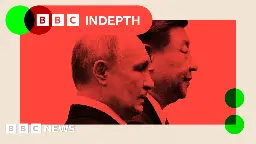
TLDR: - China's president Xi wants to maintain an alliance with Putin's Russia, while also knowing that close ties with a pariah puts at risk his stable ties with the West which he needs to help his ailing economy.
- The costly war in Ukraine has changed their relationship, exposing the weaknesses in Russia’s army and its economy.
- China’s interests are not Russia’s interests. As the senior partner in this relationship, Mr Xi will likely co-operate when it suits him – even if his “dear friend” and ally needs him.
Vladimir Putin’s state visit to China this week was a show of strength. It was a chance for the Russian president to prove to the world that he has a powerful ally in his corner.
The Russian leader is widely regarded as a pariah after ordering the invasion of Ukraine. But to China’s President Xi Jinping, he is a key partner in seeking a new world order that is not led by the US.
And Mr Xi made his guest welcome. He rolled out the red carpet, the band played old Red Army songs, and cheering children greeted both leaders as they strolled through Tiananmen Square. There was even a brief hug for the cameras.
Russian and Chinese state media focused heavily on the camaraderie between the two leaders. But in truth, this is no longer a partnership of equals.
Mr Putin came to China cap in hand, eager for Beijing to continue trading with a heavily sanctioned and isolated Russia. His statements were filled with honeyed tones and flattering phrases.
He said that his family were learning Mandarin – this was particularly noteworthy because he very rarely talks about his children in public.
He declared that he and Mr Xi were “as close as brothers” and went on to praise China’s economy, saying it was “developing in leaps and bounds, at a fast pace”. This will likely play well with Beijing officials worried by a sluggish economy.
But Mr Xi himself did not echo the tone of these lofty compliments. Instead, his remarks were more perfunctory – even bland. Mr Putin, he said, was a “good friend and a good neighbour”. For China, the welcome ceremony and show of unity is in its interests, but lavishing its guest with praise is not.
The costly war in Ukraine, which shows no signs of ending, has changed their relationship, exposing the weaknesses in Russia’s army and its economy. Mr Xi will know that he is now in charge.
The war has isolated Russia. China’s ties with the West may be tense, but Beijing has not cut itself off from the world like Russia, nor does it want to.
While the public statements may have lacked enthusiasm, President Xi did hint at the importance that China places on the relationship.
He invited Mr Putin to his official residence, Zhongnanhai. Few leaders are afforded that honour - US President Barack Obama being among them back in 2014, when ties between the two were at their best.
President Xi is attempting a fine balance - he wants to maintain an alliance with Mr Putin, while also knowing that close ties with a pariah puts at risk his stable ties with the West which he needs to help his ailing economy.
The fact is, this visit was all about the money: Mr Putin needs China’s support for his war in Ukraine.
The make-up of the Russian leader’s entourage was a sign of what he hoped to get out of the trip: he brought with him the governor of Russia’s Central Bank, his finance minister and his economics advisor.
The joint statement released to mark the visit also contained some eye-catching ideas to increase trade – building a port on an island which the two countries once wrangled over for more than 100 years, and speaking to North Korea to see if Chinese ships could navigate through a key river to reach the Sea of Japan.
It mentioned the word “co-operation” 130 times.
All of this will, of course, have been carefully watched by the US. Last month, US Secretary of State Antony Blinken warned China to stop fuelling Russia’s war and trading in components that could be used in Russian drones and tanks.
So they will not have missed the fact Mr Putin toured a state-backed university famous for its cutting-edge defense research during Friday’s visit to the city of Harbin.
The tour - and the ceremony and symbolism surrounding this visit - certainly appears to suggest Mr Xi is determined to prove that he will not be swayed by pressure from the West.
But behind the scenes of this show of unity, there may be limits to how far Mr Xi is prepared to go.
After all, China’s interests are not Russia’s interests. As the senior partner in this relationship, Mr Xi will likely co-operate when it suits him – even if his “dear friend” and ally needs him.
- The total combat losses of the enemy from 24.02.22 to 18.05.24

Загальні бойові втрати противника з 24.02.22 по 18.05.24 (орієнтовно)
#NOMERCY #stoprussia #stopruSSiZm #stoprussicism #ВІРЮвЗСУ t.me/GeneralStaffZSU/14709
- The 110th Mechanized shot down a Su-25 over the Donetsk region.

https://www.facebook.com/watch/?v=976067893986685&ref=sharing
- For the first time since the launch of Russia's full-scale invasion, no Ukrainian brigades have reported a lack of artillery shells, President Zelensky told reporters yesterdaykyivindependent.com Zelensky: No reports of artillery shortages for first time in full-scale war
Over the winter months, Ukraine's armed forces suffered a "critical" shortage of artillery shells, in large part due to delays in U.S. military aid.
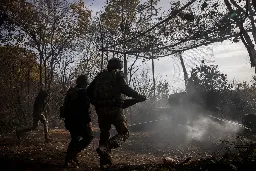
cross-posted from: https://lemmit.online/post/2934684
> ##### This is an automated archive made by the Lemmit Bot. > The original was posted on /r/ukrainianconflict by /u/Baysdarby on 2024-05-17 09:34:27+00:00. >
- War in Ukraine: Washington no longer rules out its weapons being used to strike Russian soilwww.lemonde.fr War in Ukraine: Washington no longer rules out its weapons being used to strike Russian soil
US Secretary of State Antony Blinken hinted on Wednesday that Ukrainian forces could bomb Russia with military materiel supplied by the US, something they had previously been forbidden from doing.
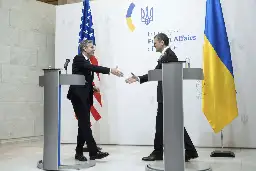
cross-posted from: https://lemmit.online/post/2928184
> ##### This is an automated archive made by the Lemmit Bot. > The original was posted on /r/ukrainianconflict by /u/Watcher_2023 on 2024-05-16 14:49:01+00:00. >
- Air defence report -18.05.2024

https://t.me/ComAFUA/291
⚡️ 13 IMPACT UAVS DESTROYED
➖➖➖➖➖➖➖➖➖
On the night of May 18, 2024, the occupiers attacked with 13 attack UAVs of the "Shahed-131/136" type from the regions of Primorsko-Akhtarsk and Kursk - Russian Federation.
💥 As a result of anti-aircraft combat, anti-aircraft missile units, mobile fire groups of the Air Force and the Defense Forces of Ukraine shot down all 13 "martyrs" in the Kharkiv, Poltava, Vinnytsia, Mykolaiv and Dnipropetrovsk regions.
Thanks for the work!
🇺🇦 Together to victory!
➖➖➖➖➖➖➖➖➖
🇺🇦 Air Force Commander Lieutenant General Mykola Oleschuk
- A border guard near Vovchansk was saved by his ID.

https://t.me/Tsaplienko/53830?single
This can only happen in the movies
The certificate saved the border guard's life
On the northern outskirts of Vovchansk, a border soldier on the pseudo "Tikhon" received numerous injuries in close combat with Muscovites.
Brothers immediately evacuated the defender from the battlefield and took him to the hospital.
Several bullets went through, breaking the bones of both legs, and one that could have been fatal, but the bullet was stopped by the ID of a serviceman of the DPS of Ukraine.
Conclusion - the certificate should always be carried with you.
- 2 tanks were destroyed at once in the Kursk region of Russia.
https://t.me/ssternenko/28728
2 Russian tanks were destroyed at once in the Kursk region💥
Yesterday afternoon, the Russians pulled a couple of tanks to our state border near Sumy region. At first, artillery worked on them, not quite successfully.
Then the operators of Wings to Hell 103 OBrTRO took up the case.
With the help of your drones, both tanks were burned🔥
- Satellite images show two Mig-31K fighters and a warehouse were destroyed by the ATACMS missile strike on the Belbek Airfield in occupied Crimea.

https://t.me/ssternenko/28701
Claimed as fresh satellite images of Belbek airfield in Crimea after ATACMS missile strikes.
Probably -2 units of MiG-31, another -1 unidentified aircraft and a warehouse of PMM.
***
https://www.twz.com/news-features/mig-31-foxhounds-confirmed-destroyed-in-new-imagery-of-belbek-air-base
- Video of UAVs hitting the oil depot last night in Novorossyisk, Russia.
https://t.me/noel_reports/12054
New and better footage of powerful Ukrainian UAV arrivals in Novorossyisk, Russia. It is reported that two oil depots and 2 terminals were hit.
- The total combat losses of the enemy from 24.02.22 to 17.05.24

Загальні бойові втрати противника з 24.02.22 по 17.05.24 (орієнтовно)
#NOMERCY #stoprussia #stopruSSiZm #stoprussicism #ВІРЮвЗСУ t.me/GeneralStaffZSU/14692
- 7 people were injured due to a UAV attack at military communications academy in St. Petersburg.
https://t.me/astrapress/55712
5 people were injured due to a UAV attack in St. Petersburg, writes tg channel "112". Two of them are in serious condition and were hospitalized. Emergency services are on the scene.
UPD: according to the Baza channel , an explosion occurred at the Budenko Academy of Communications on Tikhoretsky Prospekt in St. Petersburg. It was allegedly attacked by a drone. Seven people were injured.
According to preliminary data, two of them are in serious condition (one is in intensive care). Emergency services are currently working at the scene of the explosion.
***
https://t.me/astrapress/55717
The administration of the Kalininsky district of St. Petersburg officially confirmed information about the explosion at the Military Academy named after Budyonny.
- One dead and 8 wounded after Russian airstrikes on Ukraine's Odesaapnews.com One dead and 8 wounded after Russian airstrikes on Ukraine's Odesa
One dead and 8 wounded after Russian airstrikes on Ukraine's Odesa
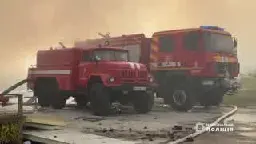
- Gunman Who Shot Slovak PM Linked to Pro-Russian Extremist Groupwww.kyivpost.com Gunman Who Shot Slovak PM Linked to Pro-Russian Extremist Group
The 71-year-old man who fired five shots at Slovak Prime Minister Robert Fico, is linked with a pro-Russian extremist group a Hungarian investigative journalist reported.
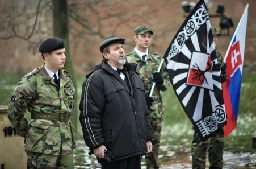
- Air Command "South" report - 17.05.2024

https://t.me/kpszsu/14362
During the day of May 17, 2024, the Russian occupiers attacked Odesa with three ballistic missiles (presumably Iskander-M) and three Kh-59/Kh-69 guided air missiles, actively using reconnaissance drones in the entire southern direction.
In general, anti-aircraft defense in the southern direction destroyed:
3 Kh-59 guided air missiles in Odesa;
2 reconnaissance UAVs "ZALA", attack "Lancet" and 1 UAV of unknown type in the Kherson region;
1 UAV of unknown type in Kirovohrad Oblast.
➖➖➖➖➖➖➖➖➖
Air Command "South"
- Georgia: Mass protests against pro-Russian government and “foreign agents” lawasranarshism.com Georgia: Mass protests against pro-Russian government and “foreign agents” law
Georgia: Mass protests against pro-Russian government and “foreign agents” law News, Apr 29th A remarkable grassroots rebellion is sweeping across Geor
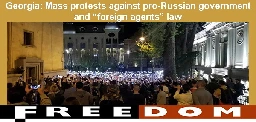
- Russian Forces Abduct and Execute Ukrainian Civilians in Vovchansk Amid Evacuationsunited24media.com Russian Forces Abduct and Execute Ukrainian Civilians in Vovchansk Amid Evacuations
Russian forces are holding civilians captive in the embattled northern part of Vovchansk, with reports of executions. Ukrainian authorities have opened investi…
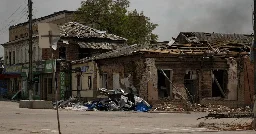
- Research and espionage: an institute staffed by Russian intelligence officers is recruiting students and scientists abroadtheins.ru Research and espionage: an institute staffed by Russian intelligence officers is recruiting students and scientists abroad
Following a series of high-profile failures and mass expulsions of uniformed “diplomats,” Russian intelligence has turned to more subtle methods, including leveraging scientific organizations with international ties. One such espionage “front” is the National Research Institute for the Development o...
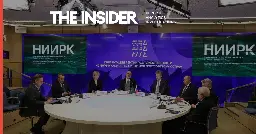
Following a series of high-profile failures and mass expulsions of uniformed “diplomats,” Russian intelligence has turned to more subtle methods, including leveraging scientific organizations with international ties. One such espionage “front” is the National Research Institute for the Development of Communications (NIIRK), which is led by ex-SVR and FSB officers. In Europe and neighboring countries, the institute organizes numerous conferences and internships. Here, intelligence officers and pro-Kremlin propagandists, under the pretense of promoting good neighborly relations, spread the notion that the West is an enemy, and that prosperity lies in friendship with Russia. The main targets are promising students and young scientists, who are ultimately groomed for espionage activities.
On June 19, 2023, Moscow’s usually quiet Korobeinikov Lane was unexpectedly closed off. Athletic-looking men with radios were bustling around its perimeter. Soon, an honor guard and official cars with flashing lights appeared. People carrying carnations gathered in front of the building that houses the National Research Institute for the Development of Communications (NIIRK). The last to arrive for the festivities was SVR head Sergey Naryshkin, who presided over the installation of a memorial plaque for former SVR director Vyacheslav Trubnikov. Speeches followed: “Vyacheslav Ivanovich worked here for two years,” “an outstanding intelligence officer and diplomat,” “a legend of intelligence,” “a knight of the Cold War,” and so on.
Before the Bolshevik Revolution of 1917, the house was home to actors Alexander Lensky and Alexander Yuzhin-Sumbatov of the Maly Theatre. Later, it was occupied by the NKVD, MGB, and KGB; the mansion hosted clandestine meetings with agents. After 1993, several businesses were based there, but over time, the place fell into disrepair, and homeless people took over the vacant premises. In April 2020, the restored mansion became the new home of NIIRK. Cars belonging to the embassies of Central Asian and Transcaucasian republics began appearing outside.
What kind of institute is this? According to its website, NIIRK’s primary mission is “the development of multilateral dialogue among peoples, cultures, religions, states, international scientific and educational organizations, and civil society to strengthen peace and harmony.” The institute’s expert research and analysis are utilized by the Presidential Administration's Office for Interregional and Cultural Relations with Foreign Countries, the Ministry of Foreign Affairs, foreign aid and cultural exchange agency Rossotrudnichestvo, the FSB's 5th Service, and the SVR.
The institute’s first official director was Irina Zavesnitskaya, co-founder of the PoiskSidelki LLC. A year later, she was succeeded by her husband, former FSB general and overseer of the Transcaucasian region, Vladislav Gasumyanov.
Friends of the Kremlin
As per The Insider's findings, over the past eighteen months, NIIRK has organized a total of twelve off-site conferences, forums, and roundtable discussions across various countries including Armenia, Georgia, Uzbekistan, Kyrgyzstan, Transnistria, Tajikistan, and Slovakia. Moreover, NIIRK has welcomed several delegations from these nations to Moscow for internships, with plans to host approximately ten more this year.
The institute primarily targets young scientists — aged 20 to 40 employed in research or academia. As one Armenian student shared with The Insider, “Throughout the internship, we were constantly reminded that without Russia, we would be doomed to become slaves to the West. Once, they casually asked me if I had relatives in Europe. Upon hearing my negative response, they lost interest in me.”
Key speakers at these conferences include General Gasumyanov, former SVR Academy head Nikolay Gribin, and former Slovak Prime Minister Jan Černogurský, who chairs the “Friends of Crimea” association. Černogurský frequently appears on Russian propaganda TV shows, where he advocates a pro-Kremlin agenda for his country of citizenship while predicting the imminent collapse of the dollar and the subsequent disintegration in the United States.
The building on Korobeinikov Lane is a frequent host to presidents from the Russian-occupied Georgian “republics” of South Ossetia and Abkhazia, along with representatives from Moldova’s Russian-occupied Transnistria region. Last year, a delegation from Vietnam even paid a visit.
The institute’s leadership also makes the rounds, with Gasumyanov visiting Serbia to hold negotiations with leaders of the For Peace and Justice in Afghanistan movement (DMSA). Spearheaded by former Afghan intelligence chief Masum Stanikzai, DMSA was established by senior officials from the previous administration who fled from the Taliban regime. It appears that the Kremlin is playing a double game: on one hand, it welcomes the Taliban to Moscow, while on the other hand, it engages with their sworn enemies.
Among other partners, NIIRK is known to have connections with the Awami Party from Pakistan. Since its founding in 1986, the group has been aligned with Moscow and was the only political force in Pakistan to support the Soviet invasion of Afghanistan, which lasted from 1979-1989. A source from Russia’s Veterans of Foreign Intelligence Association, who requested anonymity, informed The Insider that General Trubnikov — the figure honored by the memorial plaque on the NIIRK building — was well acquainted with the leadership of Awami during his tenure at the KGB residency in Islamabad.
In February 2024, NIIRK organized a conference titled “United Kingdom - EU - Russia - Middle East: Challenges and Perspectives.” Notably, the discussions took place not in Moscow, but in Bratislava, Slovakia. Among the speakers were Slovak Parliament Vice-Speaker Luboš Blaha, who accused the United States and NATO of provoking the conflict in Ukraine.
Another notable participant was former Austrian counterintelligence general Gustav Gustenau, who in 2019 was dismissed due to serious suspicions of connections with Jan Marsalek, the fugitive COO of the payment company Wirecard. In 2020, Marsalek fled to Russia. The Insider recently published yet another article in a series of investigations concerning Marsalek’s ties to Russian intelligence.
Patrushev's man in Transcaucasia
NIIRK head Gasumyanov has long been referred to as “Patrushev's man” (a reference to longtime Security Council head Nikolai Patrushev, who was recently demoted to the role of “presidential aide”). Gasumyanov himself has had quite the career. In 1982, he worked as a Komsomol district committee instructor in Kyiv, and through the Komsomol recruitment, he was directed to the Higher Courses of the KGB of the USSR. The young intelligence officer was then dispatched to the KGB Office in Ivano-Frankivsk, in western Ukraine, where he was tasked with combating manifestations of nationalism. In 1988, he was transferred to Nagorno-Karabakh, where the first clashes between the local Armenian and Azerbaijani communities had already begun. He rose to the position of deputy head of the KGB Directorate in the region, but when combat operations there escalated, all Lubyanka officers were relieved of their duties and dispersed to various other directorates.
After a period of unknown activities, in 2000 Gasumyanov found himself in the FSB Office in the city of Sochi. Two years later, he moved to the position of State Secretary of the State Reserve, which at the time was led by Alexander Grigoryev — a friend of Putin’s from their youth and a colleague of the future president in the Leningrad KGB. In the 1980s, as part of his official duties as a lieutenant colonel, Grigoryev had worn the cassock of an Orthodox priest and, under the operational guise of “Father Alexander,” directly supervised the Estonian-born Alexey Rigidier, who from 1990-2008 became better known as Alexey II, Patriarch of Moscow and All Rus’.
After the war with Georgia in 2008, the Kremlin decided to strengthen its influence in Transcaucasia. Trusted intelligence personnel were needed. and the “Patrushev man” was appointed Deputy Head of the Presidential Administration's Department for Interregional and Cultural Relations with Foreign Countries, a department staffed largely with former officers from the security services.
> The core of the Presidential Administration's Department for Interregional and Cultural Relations with Foreign Countries consists of ex-security officers
At Moscow’s “Old Square” — where the Presidential Administration has its office — the “culturologist” Gasumyanov held oversight responsibilities for Georgia, South Ossetia, and Abkhazia. Reports even surfaced in the media suggesting that he had directly intervened in the 2011 presidential elections in South Ossetia, advocating for Moscow's favored candidate, Anatoly Bibilov. Allegedly, Gasumyanov intimidated opponents of Bibilov by promising that they would receive a visit from Jambulat Tedeev, the coach of the Russian national freestyle wrestling team.
Transitioning from the presidential administration, Gasumyanov assumed the role of Chief Security Officer at Norilsk Nickel. In this capacity, the FSB officer made visits to Europe and Africa and proposed the development of a Charter on Information Security for critical industrial facilities, a proposal met with skepticism by many foreign companies.
Concurrently, Gasumyanov chaired the Security Committee at the International Platinum Group Metals Association (IPGMA), affording him access to internal documents of major global companies within the industry. Notably, on the NIIRK website, Gasumyanov shared a photo gallery that included an image of himself alongside former Italian prime minister Silvio Berlusconi.
After opposition leader Nikol Pashinyan became Prime Minister of Armenia, the Kremlin once again required the services of the former overseer of Transcaucasia, and NIIRK offered the perfect instrument for Gasumyanov to restore Russia’s influence in the region. “We have always treated our neighboring countries with care, love, and attempted to help them, from promoting independence to providing financial assistance and establishing institutions,” the “Patrushev man” said in February 2023, as Russian rockets and bombs were destroying peaceful cities in Ukraine.
> After opposition leader Nikol Pashinyan became Prime Minister of Armenia, the Kremlin once again required the services of the former overseer of Transcaucasia
Spies as supervisors
Alongside Gasumyanov, the Supervisory Board of NIIRK boasts other individuals with extensive intelligence backgrounds. One such figure is FSB General Anatoly Bolyukh, well-known to the Security Service of Ukraine and European counterintelligence agencies. After graduating from the Peoples’ Friendship University in Moscow in 1982, Bolyukh joined the KGB's Foreign Intelligence Service, operating undercover as a diplomat in Soviet embassies. Later, he was seconded to the Moscow State Institute of International Relations (MGIMO), where he served as an assistant to the rector for security matters and played a role in recruiting promising students. After MGIMO, Bolyukh was assigned to the International Academy of Fuel and Energy before finding himself back in Europe — this time with a press pass from the Izvestia newspaper.
In 2009, Bolyukh took charge of the Department of Operational Information (DOI) within the 5th Service of the FSB (Unit 26047), which is responsible for espionage internationally. The DOI's structure includes departments covering Europe, Moldova, Transcaucasia, Africa, the Middle East, Asia, and Ukraine, where intelligence reports from residencies are consolidated. Additionally, the DOI has achieved success in recruiting European politicians, as was recently reported by The Insider.
> The Department of Operational Information has achieved success in recruiting European politicians
During the 2014 Maidan protests in Ukraine, Bolyukh flew to Kyiv with a group of FSB, GRU, and SVR generals in order to aid Viktor Yanukovych. However, by the time they arrived, the situation had already turned in favor of the protesters, and on February 22 of that year, Yanukovych fled the capital, ultimately ending up in Russia. In response to Putin's dissatisfaction with the outcome, Bolyukh was removed from his position and transferred to Rosgeology, an organization historically utilized by the KGB for espionage purposes.
In 2019, there was a change in leadership at Rosgeology, with Sergei Gorkov, a graduate of the FSB Academy, assuming control of the state corporation. Gorkov brought in his own team, prompting Bolyukh’s departure. At NIIRK, the former student recruiter now oversees educational processes and enjoys discussing the concept of good neighborliness: “Tactics are essential here. It is also important to consider the level at which good neighborliness is based — the state, the people, or the elite. So, creativity and unconventional solutions are essential in this matter. Cliches and copying won't suffice.”
The Insider has obtained a list of phone contacts of the current head of the DOI, Lieutenant General Georgy Grishaev. In addition to Grishaev's current colleagues, Bolyukh's phone number is also included in the list. While it could not be determined precisely which topics the generals discuss amongst themselves, it is unlikely that “neighborly relations” is among them.
Boris Miroshnikov, an Honorary Security Service Worker, joined the Supervisory Board alongside Bolyukh. Miroshnikov commenced his service in the Counterintelligence Operations Department (UKRO) of the FSK-FSB, focusing on developing and implementing novel methods for operational and investigative activities. Miroshnikov personally established the Computer and Information Security Directorate within the FSB, now known as the 11th Center (Unit 68240). In 2002, he was assigned to the Ministry of Internal Affairs (MVD), where he assumed leadership of the Bureau of Special Technical Measures (BSTM).
The Bureau, overseen by the FSB, is responsible for tasks such as phone tapping, email hacking, and monitoring electronic payments of criminal suspects. Evgeny Chichvarkin, the founder of mobile phone retailer Euroset, accused Miroshnikov of instigating the round of persecution that led the independent entrepreneur to flee Russia in 2009. In a 2011 video address to Russia’s then-president Dmitry Medvedev, Chichvarkin labeled the BSTM leadership as a “gang of crime bosses” — with Miroshnikov chief among them.
> The Bureau, overseen by the FSB, is responsible for tasks such as phone tapping, email hacking, and monitoring electronic payments of criminal suspects
Also in 2011, the “crime boss general” became the vice president of a company called Citadel. Citadel's primary focus lies in developing software for information security and manufacturing SORM (telephone tapping) equipment for law enforcement agencies. Moreover, telecommunications operators in Russia are obligated to install SORM on their networks.
One can only speculate as to what role the wiretapping specialist has in the Korobeinikov Lane headquarters. Whatever activities it is that his official duties require, Miroshnikov’s hobbies appear to include waxing philosophically on the importance of culture: “It's a very delicate matter! It's necessary to cultivate culture in the highest sense of the word, where my life-cultural space wouldn't suppress the same space of my neighbor. It's an extremely challenging task! Any misstep is nationalism transitioning into Nazism-fascism.”
Among the other members of the Supervisory Board, notable figures include former head of the SVR Academy, Nikolay Gribin, and former deputy director of the FSB, Valentin Sobolev. Gribin, who served in the political intelligence department of the KGB's First Main Directorate in the 1980s, worked undercover as a diplomat in Denmark and Norway before transitioning to the KGB-SVR central apparatus. Judging from his speeches, Gribin is concerned about Article 13 of the Russian Constitution, which explicitly states that “ideological diversity is recognized in the Russian Federation,” and “no ideology can be established as state or mandatory.”
Another “supervisor,” General Sobolev, began his career in the Tomsk Directorate of the KGB and rose to the position of the secretary of the Directorate's Communist Party committee. After relocating to Moscow, his career took off. Sobolev has served as the first deputy director of the FSB, and later moved to the Security Council.
Following his retirement in 2012 as a Lieutenant General in the FSB, Sobolev has been a frequent speaker at events targeting young audiences. He has also spent leisure time in the affluent Gorki-2 community in the Odintsovo District, where he owns a mansion valued at around 120 million rubles ($1.32 million).
Propagandists and publishers
NIIRK owns the conference organizing company Project LLC, along with the Eurasia Daily news agency, which employs well-known pro-Kremlin political analysts and conspiracy theorists. The institute publishes three journals: “Man and the World: Dialogue,” “Perspective: Generation of Search,” and “Russia and the World: Scientific Dialogue,” all of which are distributed free of charge in CIS countries. Regular trips abroad, conferences, presentations, and publishing activities incur considerable costs. In 2022, the total assets of NIIRK amounted to 467 million rubles ($5.2 million), even if that figure fell to 273 million in 2023. Of course, “Patrushev's man” can always ask his business partners for financial assistance, and they are unlikely to refuse him. For example, the head of the Pangeo Capital fund, Yuri Kudimov, who manages investments worth $1 billion, is a known associate.
In fact, Kudimov and Gasumyanov are co-founders of Moskovskoe More Management Company LLC (ООО «УК Московское море»), which built an elite cottage settlement in Zavidovo just under 100 miles northwest of the capital. Kudimov also boasts an extensive espionage background: following his graduation from the journalism faculty of Moscow State University, he joined the KGB's First Main Directorate and completed an internship under the direction of Kim Philby, a former MI-6 officer who defected to the USSR in 1963.
Under the guise of a correspondent for Komsomolskaya Pravda, Kudimov conducted espionage activities in London until his expulsion from the country in 1985. Later, holding a Novoye Vremya press card, he operated from a KGB station in Mexico. Upon returning to his homeland, he transitioned into banking as a reserve SVR officer, bringing in a decent income by servicing Soviet debts.
In addition to his activities at Pangeo Capital, Kudimov became one of the founders of the Kim Philby Memorial Fund. European media outlets alleged that Pangeo Capital was involved in providing clandestine financing for “friends of the Kremlin,” but Kudimov successfully contested these claims in court. Nonetheless, last March, Lithuanian authorities revoked his citizenship after the country’s Ministry of Foreign Affairs determined that the activities of the “former KGB employee” were “incompatible with the national interests of Lithuania.”
